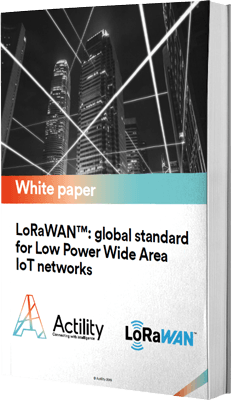
We need partners to innovate with. One of them is KPN that supports us in using the LoRa network.
Raymond de Schrevel, Business Development Manager

57 million
People benefit from the Group’s waste collection services

130
Operating storage centrers worldwide

42 million metric tonnes treated
Waste generated by Suez customers
Suez is one of the oldest multinational corporations in the world and prides itself on continuously adapting to our changing world. Suez Environment has four major activities, one of which is recycling and waste recovery. Suez is responsible for waste collection and disposal, and it also promotes waste recovery to generate renewable energy and secondary raw materials.
Aiming to support municipalities, industries and healthcare professionals in the most complex waste management projects, Suez turned to KPN– the largest telecommunication company in the Netherlands – to help implement a very innovative solution throughout the waste management chain.
Suez understood that the IoT could offer a wide range of opportunities for them and their clients.
In the Netherlands, KPN has deployed a nationwide Low Power Wide Area network based on LoRaWAN technology. This network technology offers great coverage, low consumption, long battery life and ease of deployment.
Actility has created the ThingPark software platform to help its customers such as KPN to easily roll out and operate an LPWA network. Thanks to the network solution offered by KPN and powered by Actility, Suez is now leveraging smart technology in several areas of waste management from collection to treatment but also recycling.
By placing sensors on containers of dangerous, confidential and medical waste, Suez started tracking them from the generator facility where the waste is produced, until it reaches the off-site waste management facility that will store, treat or dispose of the hazardous waste. Accurate waste management information is essential to most organizations operating in regulated industries and the healthcare sector, and today IoT brings this required detailed information and history of the waste and its movement.
Recycling bins throughout Dutch cities provide clear evidence of this successful IoT implementation. A sensor placed in each bin signals to collectors when it is full. As a result, waste vehicle collection routes can be optimized to reduce cost, traffic, and pollution. The same solution is deployed in public places such as airports and train stations. The cleaners are informed when trash bins need to be emptied, improving the workload and efficiency of the cleaning staff. In both cases, IoT brings a higher quality of service and well-being for everyone.
Suez is also connecting waste collection trucks, equipped with load sensors. Treatment facilities are informed almost in real-time of the amount of trash expected from each truck. LPWA technologies ensure that even in complex city environments and at long distances in the countryside the trucks remain connected, improving their operation and streamlining the process. Optimal visibility and control of waste management are particularly critical when collecting hazardous waste: knowing exactly how much waste has been collected is a key tool in optimizing the treatment phase. For companies dealing with industrial waste, Suez’ IoT innovations help improve collection and especially guarantees traceability throughout the disposal chain.
Some cities are encouraging their homeowners to sort their waste by installing smart bins in individual homes. These bins weigh the amount of litter received, allowing for per usage consumer billing. This incentive-based program encourages everyone to be proactive and responsible in their personal behaviors.
Suez is proud to lead the waste management revolution to make it more:
Learn more about LoRaWAN benefits to optimize your processes
https://www.actility.com/news/kpn-launches-nationwide-lora-internet-of-things-network/

Learn more about the LoRaWAN technology by downloading the Actility “What is LoRaWAN” white paper